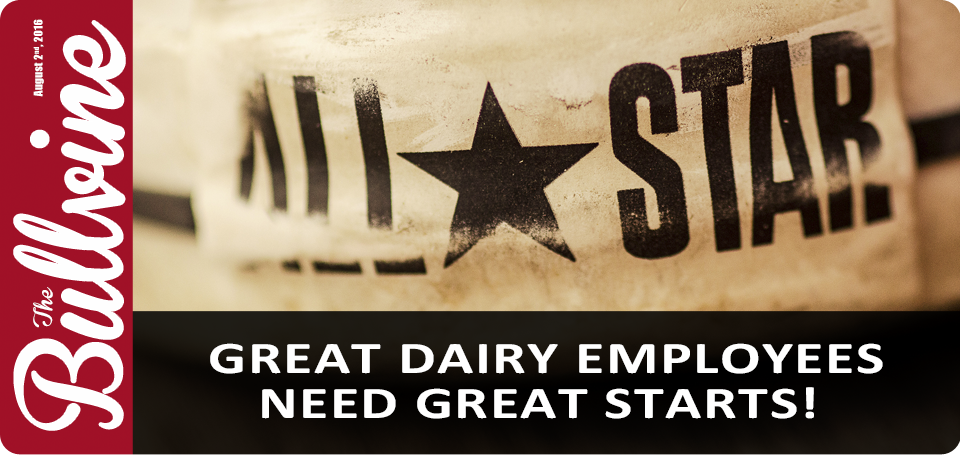Recently The Bullvine initiated some give and take with readers after our article, “From Cow Bossy to Dairy Super Boss” where we discussed the role of managers on well-run dairy operations. We considered whom to hire, what to pay, how to train and other important issues that arise between dairy bosses and their employees. The ten points that were discussed all have a legitimate impact on dairy success but today we are going to rewind the process a little bit to consider the first day and how it is one of the most important moments in dairy staff relations. If you are building an effective dairy team, it is crucial to get off to a good start.
Great Dairies Are Full of Great Beginnings
We can all appreciate the importance of great beginnings when it applies to genetics, planting seasons and milk records. When we get it right, the effects are visible and measurable all the way to the bank. Dairy staff is one area where we may experience the effects of poor beginnings without realizing exactly what caused the problem. Unfortunately, there is a big difference between a relationship that gets off to a good start and one that gets off to a bad one.
Day One on the Dairy
Assuming all the due diligence has been done, and you have hired a new dairy employee, it is important to get off to the best start possible. Regardless of whether there has been a previous relationship, it makes good sense for both sides to be as well-prepared as possible. Never assume that the myriad of details is “obvious” or “standard.” It is a sign of respect, to give your new staff member every opportunity to succeed.
Write it Down
While your plans, including starting days and dates, may be very familiar to you, it is always a good idea to write the details down for new employees. With equipment, buildings and animals to get familiar with, it could be a simple detail such as when to arrive, where to park and what to wear, that gets overlooked or misunderstood by the new person. Confirm all points discussed either by email or in writing. You won’t regret starting off by making sure everything is clearly understood. On the other hand, misunderstandings can result in all your careful recruiting, interviewing and negotiating being wiped out by frustrations which could lead to a rocky or terminated start.
A Place for Everything and Everything in Its Place
Once again, you may think that everything on your operation is self-evident and easily understood, but an orientation tour not only gives new hires the chance to ask questions, it can also be an unpressured way to start building a good working relationship. Now is the time to point out special safety considerations, medication storage or details regarding equipment operation. If your operation is complicated in any of these areas, you can set your new staffer’s mind at ease by explaining plans for training as needed. Whether you have two employees or two hundred, don’t leave new employee orientation to chance.
A New Employee Checklist
Everyone has been a newbie at least once in their life, and so we can identify with the feelings of someone who is thrust into a new environment. New dairy staff must be helped to settle in comfortably, otherwise they may fail to perform well. Here are some basic considerations.
The Paper Work
- A written description of the job and its responsibilities.
- Contact information. A chart that shows how the new position relates to staff organization.
- All of the necessary administration and benefits forms.
- A handbook, if there is one, for any of the job responsibilities.
The People Parts
- Provide an opportunity to meet coworkers, specifically those he or she will work closely with.
- You could provide a “buddy” or mentor for the new hire so that they have someone they can go to for more information or help.
- Set up opportunities for ongoing orientation and training. Who will provide it? When? And Where?
Knowing The LITTLE Details Makes a BIG Difference
- Where does staff park?
- What should I wear?
- To whom should I report?
- What is the work schedule? Where is it posted?
- Where are restrooms, telephones, and computers?
- What should be said when answering the phone?
- What food, snacks or beverages are provided? Should I bring my lunch?
- Is the farm tobacco or smoke-free?
- What is the policy regarding use of cell phones or personal computers?
- What record keeping is required regarding animal treatment?
- What record keeping is required regarding work hours?
- What job supervision and review are scheduled?
- What opportunity does the employee have to give feedback?
If you take care of these details, the likelihood of a smooth start for the new employee will be increased. Even though you probably won’t micromanage each day’s activities, it is important to make sure that the employee knows that you are available to answer concerns.
The Bullvine Bottom Line
We know that employee turnover is expensive and that it is important to retain valuable employees. Is your first-day strategy achieving the desired results? Is it decreasing turnover? The goal is that everyone joining your dairy staff overcomes their fears, fits into the workforce and becomes a productive employee. This is the foundation that successful dairies are built upon.

Get original “Bullvine” content sent straight to your email inbox for free.















Leave a Reply
You must be logged in to post a comment.